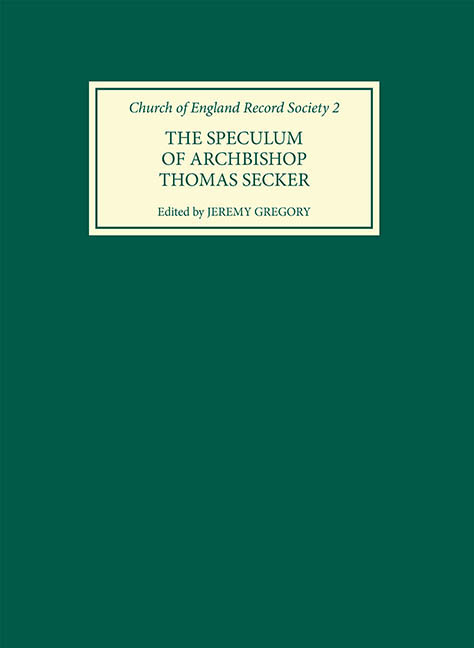Book contents
- Frontmatter
- Dedication
- Contents
- Acknowledgements
- Introduction: Archbishop Thomas Seeker's Speculum and the State of the Church in the Mid Eighteenth Century
- Editorial Conventions
- Abbreviations Used by Seeker and his successors
- Abbreviations Used in Footnotes
- Note on the Authors of the Text
- Note on Principal Informants
- Note on Dates
- Note on Spelling of Parishes
- Note on Pagination
- Articles Issued by Archbishop Seeker in 1758
- Maps
- ARCHBISHOP SECKER'S SPECULUM
- Index of People, institutions and Principal Sources
- Index of Parishes, Chapels and Places
- Miscellaneous Endmatter
Introduction: Archbishop Thomas Seeker's Speculum and the State of the Church in the Mid Eighteenth Century
Published online by Cambridge University Press: 21 August 2020
- Frontmatter
- Dedication
- Contents
- Acknowledgements
- Introduction: Archbishop Thomas Seeker's Speculum and the State of the Church in the Mid Eighteenth Century
- Editorial Conventions
- Abbreviations Used by Seeker and his successors
- Abbreviations Used in Footnotes
- Note on the Authors of the Text
- Note on Principal Informants
- Note on Dates
- Note on Spelling of Parishes
- Note on Pagination
- Articles Issued by Archbishop Seeker in 1758
- Maps
- ARCHBISHOP SECKER'S SPECULUM
- Index of People, institutions and Principal Sources
- Index of Parishes, Chapels and Places
- Miscellaneous Endmatter
Summary
The Nature and Scope of the Speculum
It was dissatisfaction with the all too frequently bland and unhelpful answers given by churchwardens in the seventeenth century to the visitation queries described by Dr Fincham in the first volume of this society's proceedings which prompted bishops in the early eighteenth century to direct their questions to the parish clergy, in the hope of eliciting fuller responses. Archbishops of Canterbury were amongst the pioneers here. William Wake, first while bishop of Lincoln in 1706 and then at Canterbury in 1716, has been given the credit for developing the system of ten or twelve questions on printed forms, with sufficient space under each question for reply, which became the norm favoured by diocesans throughout the eighteenth century. The surviving series of visitation queries and returns for the diocese of Canterbury covering the years 1716, 1720, 1724, 1728, 1758, 1786 and 1806 are illuminating documents, and can be seen as attempts by eighteenth-century primates to familiarise themselves with their new diocese. They are testimony to the fact that, although living at Lambeth, eighteenth-century archbishops were concerned to have as detailed a knowledge as possible of the clergy and parishioners under their charge. The Speculum of Archbishop Thomas Seeker (LPL, VG 2/5) was principally a digest of the returns submitted to Seeker as part of his primary visitation of the diocese and peculiars of Canterbury during the summers of 1758 to 1761.
The Canterbury Speculum is a book measuring 38.5 cm x 24 cm, consisting of 468 pages of good quality paper, paginated by Seeker on the recto and written in Seeker's characteristically regular and rounded hand. After three unnumbered pages (in this edition marked i-iii), those pages numbered 1 to 424 are taken up with the Speculum. Seeker began the entries for each parish on a new page, arranged alphabetically within deaneries, starting with the diocese of Canterbury, and then moving through the peculiars. Information under each parish (which was essentially in note-form and often not in continuous prose) was mainly taken from the replies to his visitation queries and broadly followed the ordering of the questions as set out in the visitation articles.
- Type
- Chapter
- Information
- The Speculum of Archbishop Thomas Secker , pp. ix - xxxPublisher: Boydell & BrewerPrint publication year: 1996



